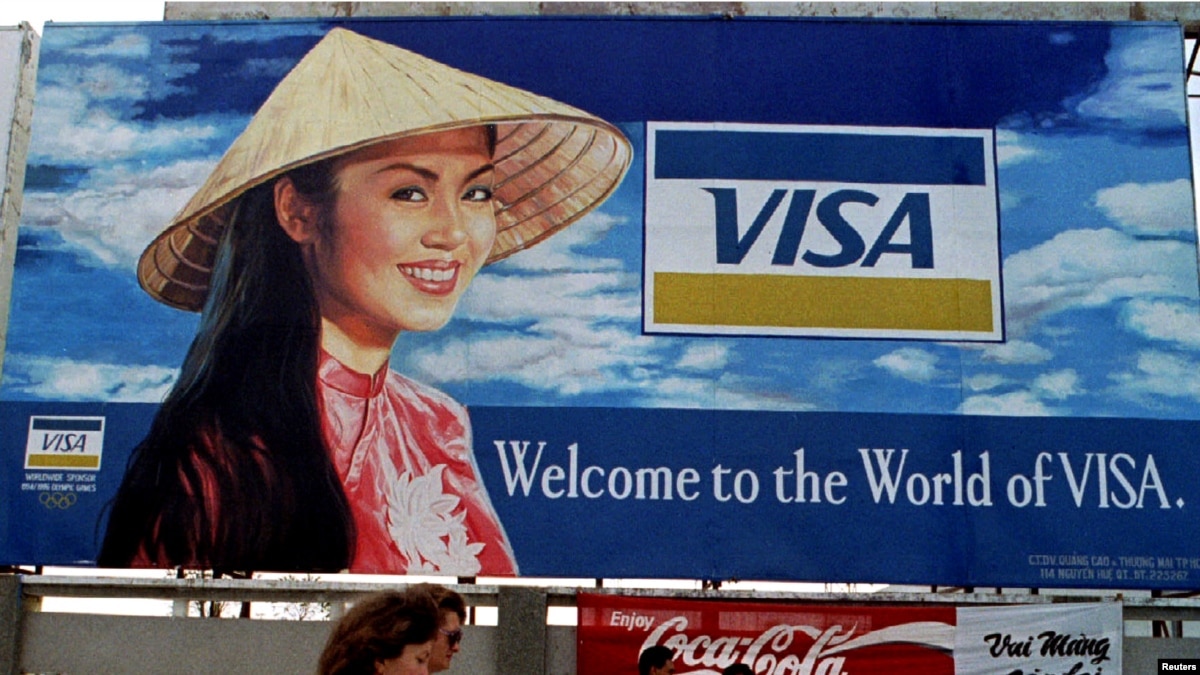
At a new Vietnamese restaurant last week, a diner asked to pay by credit card, so the waitress brought out a card reader she’d never used before. After a minute, she wondered why the machine didn’t ask for a PIN, only to learn that it was not required for credit cards, only debit cards.
Small businesses like the eatery are still learning the ropes, because paying by credit remains a new trend in Vietnam. But it is telling that even an enterprise of that small size is adopting point-of-sales machines, a sign that credit and digital transactions are on the rise at all levels of commerce big and small in the country.
This may present a "dao hai luoi," or a double edge sword. Advancing technology like e-payments can contribute to what is already one of the fastest-growing economies in the world. But at the same time, growing reliance on credit to drive consumption -- as in the U.S. consumption-led economy -- increases the risk that Vietnamese will take on more loans than they can bear, or live beyond their means.
Credit trends are good and bad
It’s not just Vietnam. This comes at a time of increasing fears around the world that too much debt might trigger the next global recession -- from the government bonds held by Italy’s banks, to the borrowing spree of China’s local governments, to the increased U.S. interest rates that make it harder for developing countries to pay back loans denominated in dollars.
In Vietnam, data from payments company Visa in September showed that digital transactions jumped 45 percent from June 2017 to June 2018. The numbers were not broken down into credit versus debit payments, but they are an indication that Vietnamese are using more credit cards.
The overall change is good for Vietnam because it makes it easier to track legitimate business activity, according to Truong Minh Ha, who is head of client relationship management at Visa Vietnam and Laos.
“Not all of the shadow economy is illegal but a lot of it is. Smuggling, money laundering,” she said. “It’s not traced or regulated, so government loses in terms of tax revenue, and businesses can’t compete.”
Vietnamese now favor buying on credit
Credit cards are part of a broader shift across the Southeast Asian country, where it used to be more common to pay cash for large purchases, like houses or motorbikes, and for small ones, like e-commerce products. But now Vietnamese increasingly take out loans to buy those goods.
Lending spiked 39 percent in 2017 at FE Credit, according to credit ratings company Moody’s. It said FE Credit enjoys market share of about half of Vietnam's consumer finance sector.
“These strengths are partly offset by the company's exposure to the high credit risk inherent in Vietnam's rapidly growing unsecured consumer finance market,” Moody’s said in September.
But it added that FE Credit’s loan growth came with weaker asset quality and looser underwriting standards. That means borrowers’ financial situations aren’t as strong, raising their chances of default.
Change is afoot in the micro-loan space, too. Instead of waiting until they can afford a cell phone or washing machine, factory workers now have the option of financing the products against their monthly salaries. As with the payday lenders in the U.S., Vietnamese repay the loans by allowing the lender to lay early claim to a piece of their next paycheck.
Too much credit card use can be risky
They take out these micro-loans using a smartphone app, just one of the many ways financial technology is evolving in Vietnam. But the changes could create a mismatch between FinTech – financial technology – and state oversight.
“A lot of things the government do is right, [like] how to protect the consumer,” said Nguyen Manh Tuong, executive vice chair and president of MoMo e-wallet. “The technology changes so fast that all the regulations [have] a big challenge to catch up. I think we can learn the way China [has a] more modern, advanced FinTech sector, more sandboxes.”
He was referring to regulatory sandboxes, which allow startups to experiment with new ideas with limited legal liability.
Countries must communicate
The challenges go beyond Vietnam, according to Nguyen Huynh Phuong Thao, a certified accountant with the Ho Chi Minh City bar association. She said it’s time for global cooperation to regulate all the new ways people are handling and using money.
“When it comes to transactions involving technology, they have a cross-border nature, and so dialogue among countries is needed,” she said. “Countries need to figure out a way to work hand in hand to come up with consistent regulations.”
Read More Vietnam Finds New Ways to Spend, and Pile up Debt : http://bit.ly/2RfiS0N
No comments:
Post a Comment